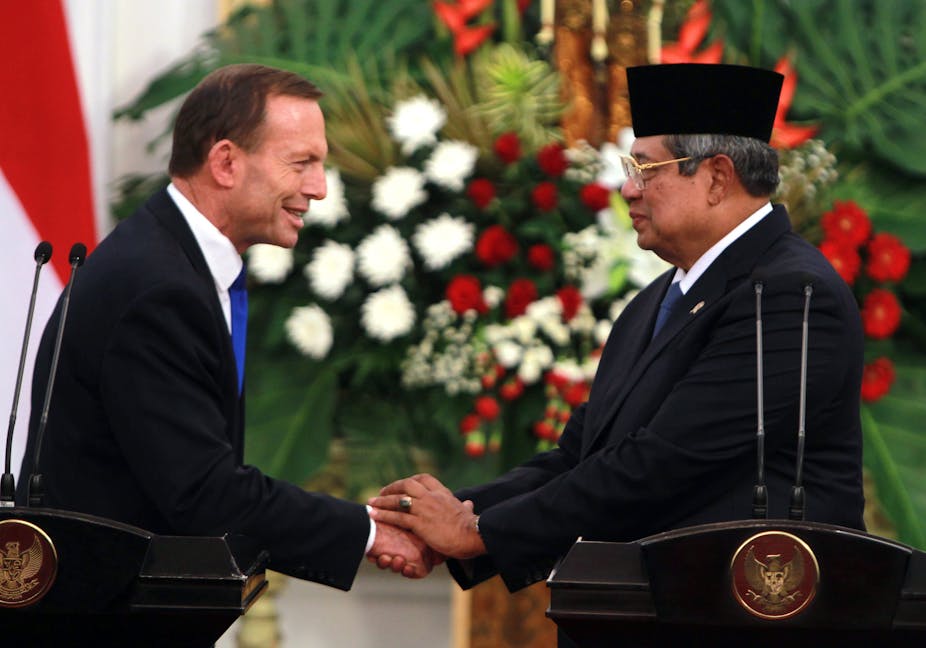September 30 is an important date in Indonesian history. On that day in 1965 the Indonesian military seized power and unleashed a massacre of innocent civilians, killing and incarcerating hundreds of thousands of people.
In that context, it was an odd day for a new Australian Prime Minister to visit Indonesia. But an interesting point of departure to assess how a democratic Indonesia views Australia.
The highly emotive and contentious history continues to occupy media attention 48 years after the event. A great deal remains unresolved. No one has been prosecuted for one of the worst genocides in human history. Films are still banned for straying too far from the official explanation of what happened that night in 1965 and the military brutality that followed.
But a lot has also changed. Indonesia’s leading English language daily, the Jakarta Post, called for:
…an official apology [that] will be important step toward demonstrating the Indonesian state’s seriousness about drawing a line under the dark legacy of the New Order era.
The Australian general public is yet to fully comprehend the massive transformation that Indonesia has undergone in the last decade from military dictatorship to thriving democracy with a loud, diverse, unruly media.
While Australians generally, and Indonesia specialists certainly, rejoiced in the fall of Suharto, democracy has not made relations between Jakarta and Canberra any easier.
During the years of the Suharto dictatorship (1965 - 1997), successive Australian governments had two advantages in dealing with Indonesia. They knew exactly who they were dealing with and knew also, that the Suharto regime’s view was the only one that mattered.
The current Indonesian government, like any other elected government, can only act within the limits of the voting public’s opinion. And like never before, any Australian policy needs to understand the complex undercurrents in this massive and unique democracy in our neighborhood – unique not only as the best functioning democracy in any majority Muslim nation but also arguably the most diverse of nations.
While Indonesia was under dictatorship, Australia could always occupy the high moral ground of democracy. Indeed, the generation of students who marched against Suharto in the late 1990s looked to Australia both as a source of scholarly critique of their government and as a model for a multi-cultural, multi-ethnic, highly tolerant democracy.

Prime minister Abbott arrives in Jakarta at a time when Australia’s moral authority in the minds of the Indonesian public has largely waned.
Australia has a particular image problem in the region around its treatment of asylum seekers. The language of “border protection” when dealing with unarmed women and children in leaky boats is easily seen as overly muscular.
Recently most Indonesian daily newspapers have run screaming headlines about Australia’s inhumane treatment of refugees. Even the Kompas newspaper, old, respected, middle-of-the road, Catholic-owned and generally sympathetic to Western positions, has begun to question Australian policy on asylum seekers since the latest drowning at sea.
But more generally, Australia simply does not any longer constitute a model for a progressive, representative, multi-cultural democracy in the minds of Indonesians.
Internationalised, media savvy, English-literate Indonesians noticed that the Australian media treated their first woman prime minister, Gillard, as despicably as Indonesia’s media had treated their first female President, Megawati. Kompas, Jakarta Post and other national Indonesian newspapers have noted that there is just one female minister in the Abbott cabinet.
When Susilo Bambang Yudhoyono (SBY), replaced Megawati as President, he appointed four women as cabinet ministers, including into two key economic portfolios – finance (Sri Mulyani) and trade (Mari Pangestu). Throughout his two terms, SBY has had at least four women in senior cabinet positions.
The current Indonesian cabinet is also highly diverse in ethnic and religious representation – with Catholics, Protestants, a Hindu and Indonesians of Chinese origin represented in this cabinet.
For all the short-comings of the Indonesian government (and needless to say, many are well-documented), every Indonesian cabinet since 1998 has been carefully constructed to democratically represent Indonesia’s national diversity.
The vast Indonesian media is critically scrutinising many aspects of Australian politics, including the make-up of its government. Australia has a public relations exercise to win in Indonesia, that goes way beyond simply a relationship between two executive governments.

